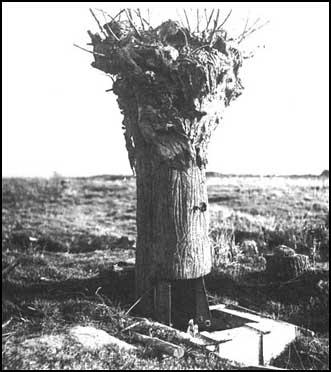Snipers in the First World War
Soldiers in front-line trenches suffered from enemy snipers. These men were usually specially trained marksmen that had rifles with telescopic sights. German snipers did not normally work from their own trenches. The main strategy was to creep out at dawn into no-man's land and remain there all day. Wearing camouflaged clothing and using the cover of a fake tree, they waited for a British soldier to pop his head above the parapet. A common trick was to send up a kite with English writing on it. Anyone who raised his head to read it was shot.

Primary Sources
(1) In January 1916, a British sniper officer produced a teaching pamphlet, Notes From the Front.
It is absolutely essential that the use of the telescope be taught from the stalking of Big Game point of view. If we had one Officer teaching it in every battalion of our army in France, we should kill a lot of Germans. Not only this, but the work of the Intelligence Officer would be greatly facilitated. With 4 good telescopes on every battalion front, very little can happen in the enemy line without our knowing it.
(2) R. A. Chell, had his first experience of sniper duty in September, 1915.
After about fifteen minutes quiet watching - with my rifle in a ready position - I saw a capless bald head come up behind the plate. The day was bright and clear and I hadn't the slightest difficulty in taking a most deliberate aim at the very centre of that bright and shiny plate - but somehow I couldn't press the trigger: to shoot such a 'sitter' so deliberately in cold blood required more real courage than I possessed. After a good look round he went down and I argued with myself about my duty. My bald-headed opponent had been given a very sporting chance and if he were fool enough to come up again I must shoot him unflinchingly. I considered it my duty to be absolutely ready for that contingency. After about two minutes he came up again with added boldness and I did my duty. I had been a marksman before the war and so had no doubt about the instantaneousness of that man's death. I felt funny for days and the shooting of another German at 'stand-to' the next morning did nothing to remove those horrid feelings I had.
(3) Lieutenant Neville Woodroffe, letter sent during the Mons retreat (3rd September, 1914)
We have been trekking hard all these last days. Heat and dust terrible. We were in action the day before yesterday. We got in a wood and were surrounded by Germans. The Germans are very fond of wood fighting and detail snipers to get up trees. We lost considerably including nine officers.
(4) A message attached to German kite received by the 7th Battalion of the Royal Sussex Regiment on 7th July, 1915.
We Germans fear nothing in the world, and we Germans await victory. Englishmen! How badly you shoot. The Russians are defeated; so will you be. You Englishmen, we have wine, sausage and meat, you English are hungry and thirsty. You stupid soldiers; do not let yourself be misled and do not believe your superiors that Russia and France have up to now been victorious. They have been defeated by the Germans. The writing of this has been done by two German soldiers.
(5) Robert Graves, Goodbye to All That (1929)
The Germans had the advantage of having many times more telescopic sights than we did, and bullet-proof steel loop-holes. Also a system by which snipers were kept for months in the same sector until they knew all the loopholes and shallow places in our trenches, and the tracks that our ration parties used above-ground by night, and where our traverses occurred and so on, better than most of us did ourselves. British snipers changed their trenches, with their battalions, every week or two, and never had time to study the German trench-geography. But at least we counted on getting rid of the unprofessional sniper. Later we secured an elephant-gun that could send a bullet through enemy loopholes and if we failed to locate the loop-hole of a persistent sniper, we tried to dislodge him with a volley of rifle-grenades, or even by ringing up the artillery.
